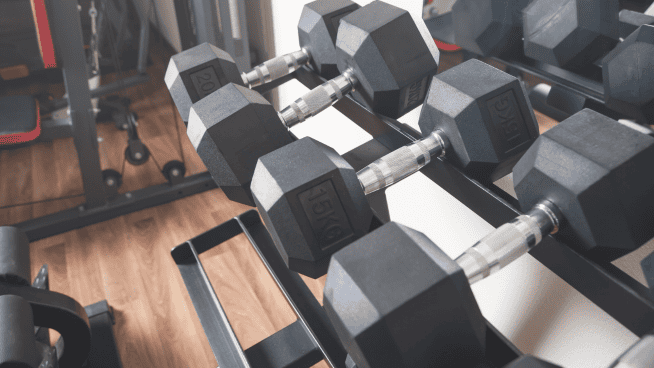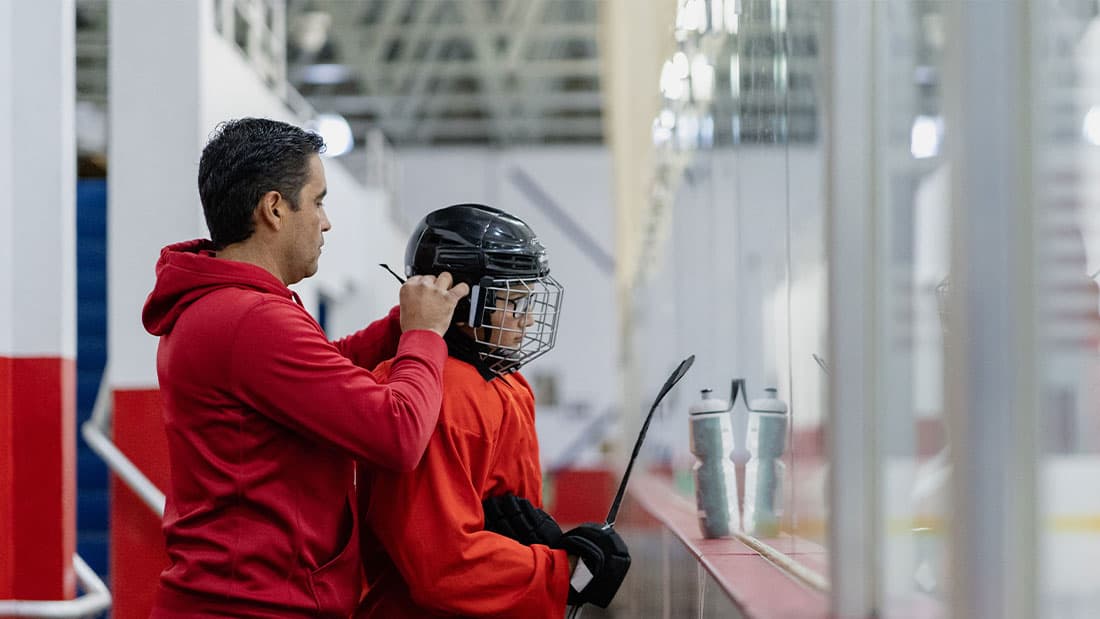College-hosted summer camps are excellent recruiting tools for both athletes and coaches. Athletes can evaluate the school, the campus, the athletic program and the coaches, while the coaches get a first-hand look at the athletes and their skills.
According to Herb Hand, recruiting coordinator for West Virginia University football, almost 75 percent of the athletes in WVU’s last three signing classes attended their football summer camp. This stat proves that if you don’t attend camps hosted by schools that are checking you out, you’re giving other prospects a competitive edge.
Here, Hand tells us what athletes have to do to get the most out of their camp experiences.
STACK: What’s the best way for an athlete to introduce himself?
Hand: I like somebody who looks me in the eye and shakes my hand with a nice, firm handshake. We like a person who knows how to communicate. When you talk to somebody, make sure you say your name clearly. When a player mumbles his name and looks at the ground, he doesn’t come off too well. It doesn’t hurt to say where you’re from and what position you play, either.
STACK: Should an athlete initiate the introduction, or wait for you to come to him?
Hand: It’s always good to take the initiative to introduce yourself. I’d love it if a player came up to me and said, “My name is Joe Smith, and I play tight end. I look forward to working with you throughout camp. I hope you have the opportunity to look at me and give me an honest opinion of what you think I can do to improve.”
STACK: So you like athletes who want to be coached at camp?
Hand: When you go to a camp, you should go for the opportunity to work with the coach. And when the coach constructively criticizes you or coaches you up, you should take it to heart and do your best to improve along those lines. That’s what we look for throughout the camp; we want to see if a guy is coachable.
STACK: How competitive or aggressive should an athlete be when he competes in drills?
Hand: We want guys who go out and compete hard, but play within the rules. We don’t want guys who showboat. A guy who goes out and competes, gets better and does the best he can every snap—he doesn’t have to be bragging.
STACK: So are showboating and trash talking always negative with you?
Hand: We have guys on our team who talk back and forth to one another, but they do it more out of friendship. It’s a good natured kind of trash talking. But some guys go over the top, and we’re just not into that stuff. If a guy wants to point out when he did something great, he should be just as willing to point out when he screws up. He should stand up in front of everybody, point at himself and say, ‘That was me who missed that block.’ But when you make a play, always act like you’ve done it before and like you’re going to do it again. You don’t have to make a production out of it.
STACK: What do you look for in terms of how athletes interact with others?
Hand: One thing I like to see is a guy who is willing to coach younger kids. I like someone who, when he’s not taking a rep, is paying attention to what’s going on, learning from other guys’ mistakes and helping coach up other players.
STACK: How important is an athlete’s presentation and what he wears?
Hand: We evaluate how a guy carries himself off the field. There’s nothing wrong with expressing your personality in what you wear, but there’s something to be said for being presentable. We have expectations about how our players carry themselves around campus. We’re not big on pants hanging halfway down. Wear a belt if you have to. And if you want to wear a hat, wear it straight or backward. We’re not into having your hat cocked to the side and all that stuff. We also don’t allow our players to wear headsets or sunglasses in meetings.
STACK: What do you suggest a player do in his downtime to make a good impression?
Hand: Downtime isn’t as much about making a good impression as it is about not making a bad impression. A lot of times, downtime is when guys get into messing around, and the next thing they know, they’re caught up in something that escalates into a negative situation. Understand what downtime at camp is for—to get your rest, get your legs back and have a meal.
STACK: What should young athletes talk to coaches about when they’re off the field?
Hand: We don’t want guys who talk football all the time. To me, that’s almost annoying. I’d rather have a guy who sits down and talks, so I can just get to know him as a person, rather than talking Xs and Os.
STACK: Do you have any other tips that we haven’t talked about?
Hand: During drill work, we want guys who want to compete and play football. We want guys who want to take reps. Some guys at camp take a rep and then stand around or hang out by the water jug. They may not think we see that, but we look at how a guy competes in every drill in every practice.
RECOMMENDED FOR YOU
MOST POPULAR
College-hosted summer camps are excellent recruiting tools for both athletes and coaches. Athletes can evaluate the school, the campus, the athletic program and the coaches, while the coaches get a first-hand look at the athletes and their skills.
According to Herb Hand, recruiting coordinator for West Virginia University football, almost 75 percent of the athletes in WVU’s last three signing classes attended their football summer camp. This stat proves that if you don’t attend camps hosted by schools that are checking you out, you’re giving other prospects a competitive edge.
Here, Hand tells us what athletes have to do to get the most out of their camp experiences.
STACK: What’s the best way for an athlete to introduce himself?
Hand: I like somebody who looks me in the eye and shakes my hand with a nice, firm handshake. We like a person who knows how to communicate. When you talk to somebody, make sure you say your name clearly. When a player mumbles his name and looks at the ground, he doesn’t come off too well. It doesn’t hurt to say where you’re from and what position you play, either.
STACK: Should an athlete initiate the introduction, or wait for you to come to him?
Hand: It’s always good to take the initiative to introduce yourself. I’d love it if a player came up to me and said, “My name is Joe Smith, and I play tight end. I look forward to working with you throughout camp. I hope you have the opportunity to look at me and give me an honest opinion of what you think I can do to improve.”
STACK: So you like athletes who want to be coached at camp?
Hand: When you go to a camp, you should go for the opportunity to work with the coach. And when the coach constructively criticizes you or coaches you up, you should take it to heart and do your best to improve along those lines. That’s what we look for throughout the camp; we want to see if a guy is coachable.
STACK: How competitive or aggressive should an athlete be when he competes in drills?
Hand: We want guys who go out and compete hard, but play within the rules. We don’t want guys who showboat. A guy who goes out and competes, gets better and does the best he can every snap—he doesn’t have to be bragging.
STACK: So are showboating and trash talking always negative with you?
Hand: We have guys on our team who talk back and forth to one another, but they do it more out of friendship. It’s a good natured kind of trash talking. But some guys go over the top, and we’re just not into that stuff. If a guy wants to point out when he did something great, he should be just as willing to point out when he screws up. He should stand up in front of everybody, point at himself and say, ‘That was me who missed that block.’ But when you make a play, always act like you’ve done it before and like you’re going to do it again. You don’t have to make a production out of it.
STACK: What do you look for in terms of how athletes interact with others?
Hand: One thing I like to see is a guy who is willing to coach younger kids. I like someone who, when he’s not taking a rep, is paying attention to what’s going on, learning from other guys’ mistakes and helping coach up other players.
STACK: How important is an athlete’s presentation and what he wears?
Hand: We evaluate how a guy carries himself off the field. There’s nothing wrong with expressing your personality in what you wear, but there’s something to be said for being presentable. We have expectations about how our players carry themselves around campus. We’re not big on pants hanging halfway down. Wear a belt if you have to. And if you want to wear a hat, wear it straight or backward. We’re not into having your hat cocked to the side and all that stuff. We also don’t allow our players to wear headsets or sunglasses in meetings.
STACK: What do you suggest a player do in his downtime to make a good impression?
Hand: Downtime isn’t as much about making a good impression as it is about not making a bad impression. A lot of times, downtime is when guys get into messing around, and the next thing they know, they’re caught up in something that escalates into a negative situation. Understand what downtime at camp is for—to get your rest, get your legs back and have a meal.
STACK: What should young athletes talk to coaches about when they’re off the field?
Hand: We don’t want guys who talk football all the time. To me, that’s almost annoying. I’d rather have a guy who sits down and talks, so I can just get to know him as a person, rather than talking Xs and Os.
STACK: Do you have any other tips that we haven’t talked about?
Hand: During drill work, we want guys who want to compete and play football. We want guys who want to take reps. Some guys at camp take a rep and then stand around or hang out by the water jug. They may not think we see that, but we look at how a guy competes in every drill in every practice.











